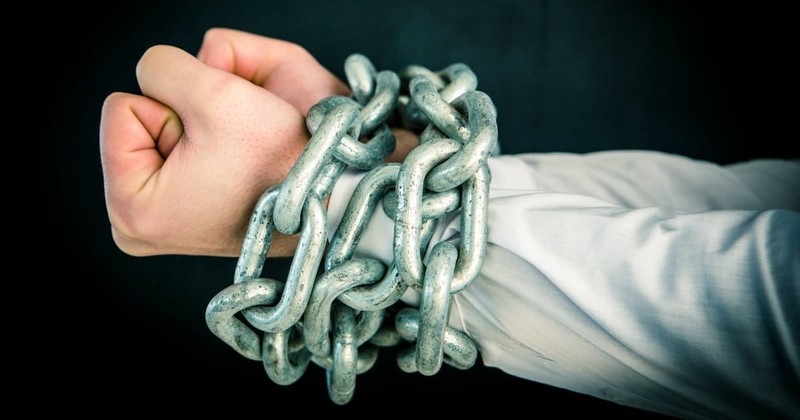
I hadn’t stepped foot in a church in well over three years, no thanks to the distractions, temptations, and stresses of college life that seemed to capture my heart and attention. But I had just graduated a couple months prior, and I could not take the guilt and shame looming over me one more day. I was tired of running from God, and I was tired of trying to control everything in my life.
I didn’t fully understand it yet, but I was ready to wave my white flag and surrender to God what I had been trying to hold onto for so many years.
During praise and worship, I felt the walls that I had built up around my heart start to crumble and by the third song, this secretly shy and insecure girl found herself slowly lifting her hands to heaven and for the first time in a long time, didn’t care what anyone thought. Suddenly, I heard the voice of the Father (through what I now know was the Holy Spirit) whisper to my heart, “Welcome home.”
Tears rolled down my cheeks and all of a sudden, my arms were stretched straight up as high as they could go as I sang along with the congregation about the greatness of our God. This “God-moment” changed the course of the rest of my life as I ran straight into the arms of the Father, and I never looked back.
I think every believer has experienced a sort of prodigal journey too, of choosing our own way over God’s way, looking to the world for fulfillment and perhaps turning our backs from God, even if it was only for a short time. That being said, I think we can all glean from the wisdom found in the story of what some Bible translations call “The Parable of the Lost Son” found in Luke 15: 11-32.
Image Credit: Thinkstock.com

1. We have a much better inheritance than “earthly goods” that does not run out; the Father gives us an inheritance of eternal life in Christ in full.
When we believe on the Lord Jesus as our Savior, we receive life eternal and all that He died for us to have. The Greek word for salvation, “soteria,” includes the vast richness of the Hebrew word, “shalom” or peace. The word “shalom” means completeness, wholeness, peace, health, welfare, safety, soundness, prosperity, perfectness, fullness, rest, harmony, absence of agitation or discord, to be complete, perfect and full.
Image Credit: Thinkstock.com

2. When we try to find acceptance and pleasure in the world, we will eventually be disappointed and left in total lack spiritually.
The things of this world are not life-giving and will leave you feeling empty. Though they may satisfy you for a season, eventually what the world offers fades in its appeal and satisfaction. In contrast, the acceptance and pleasure God gives us never, ever fades or runs dry. We will never exhaust the end of God’s love and care for us—that is something worth running back into His arms for.
Image Credit: Thinkstock.com

3. When we choose our way over God’s way and follow our selfish and fleshly desires, we become a slave to our sin once again and end up living in filth.
Jesus answered them, “Truly, truly, I say to you, everyone who practices sin is a slave to sin (John 8:34, ESV).We don’t recognize our enslaved condition, but when we give into temptation, choosing our selfish desires, we trade the beauty of the Kingdom for the dirt of the pigpen. We think we are getting something we want, and maybe we feel satisfied for a moment, but what we have is nothing work celebrating.
Image Credit: Thinkstock.com

4. This filth, or “pigpen,” is no place for a child of God to be fed spiritually.
We will undoubtedly become spiritually weak, starving for hope, and desperate to fill our hunger with anything that will take the pain away. The “food” of the pigpen will only leave us hungrier and more desperate – which hopefully we’ll drive us back into the arms of our Lord and Savior.
Image Credit: Thinkstock.com

5. To see total life transformation, we must come to the end of ourselves and we must awaken to our righteousness that Christ died for us to have in Him!
If you cling to your life, you will lose it, and if you let your life go, you will save it (Luke 17:33, NLT). In the upside down kingdom of God, losing our lives means finding them in Christ. What this means is that when we die to our desires, we find a better thing – life in Christ! His righteousness is worth so much more than the life we make for ourselves. It is worth laying down our lives for the sake of reconciling our lives to Christ.
Image Credit: Thinkstock.com

6. Repentance is a heart turning to God, acknowledging that only He knows what is best for our lives. We choose to trust in Him alone and not our desires.
Repentance is essential for a child of God. It’s how we mature in our faith. Without repentance, we either fall into legalism or pride when it comes to our heart’s natural condition. Repentance frees us from the bondage of sin and ushers us into the forgiveness of God. It’s when we repent that we will discover that we belong in God’s presence.
Image Credit: Thinkstock.com

7. Just like the father in the parable, our Heavenly Father always has His eye on us, even when we stray from Him and go our own way. He is ready and waiting for our return back home to Him with open arms.
And he arose and came to his father. But when he was still a great way off, his father saw him and had compassion, and ran and fell on his neck and kissed him (Luke 15:20, NKJV).
No matter how long and how far we wander away from our Heavenly Father, when we choose to turn back to him He is right there, carrying us back to His path for us. We are only ever one step back toward his favor and mercy. His arms are wide and waiting for us to throw ourselves back into them. What a beautiful thing to dwell upon!
Image Credit: Thinkstock.com

8. God’s love is abundant, and His mercy shown on the Cross will always triumph over judgement.
For the Lord is good; his steadfast love endures forever, and his faithfulness to all generations (Psalm 100:5, ESV).
It would make sense if the Father had asked his prodigal son had to prove his loyalty, to pay him back, to make amends for his sins. But he didn’t. He threw his arms open, welcomed him back with no strings attached, prepared a feast and enjoyed his presence. Thank you Lord that this is your posture toward us!
Image Credit: Thinkstock.com

9. As believers, we must guard our heart from self-righteousness and a critical and judgmental spirit toward our wayward brothers and sisters in Christ.
We should pray that their eyes would be opened to their rebellious and destructive lifestyle, repent, and run back to the Father’s arms. We need to understand that our position as a son or daughter of God isn’t based on our works, but Christ’s work on the Cross alone. Even when we fall, mess up, and choose to live in rebellion or recklessly, God still calls us His child. The same is said for those of us who walk uprightly before the Lord and are obedient towards Him. Jesus is the only One who gave us the right to be called children of God (John 1:12).
Image Credit: Thinkstock.com

10. As believers, we should rejoice when a prodigal comes home.
Our response should always be celebration when one of our brothers or sisters in Christ repents and returns to the Father. The family of God will be stronger every time a believer remembers the importance of their identity as a child of God.
I pray that the next time you are reading the parable of the prodigal son, you take some time to reflect on the goodness and kindness of your Heavenly Father, knowing that nothing you could ever do will ever be able to change His love towards you or your brothers and sisters. The same mercy we have received should be the same measure of mercy we extend to our struggling brothers and sisters. If you find yourself running away from God, and trying to go your own way, dear friend, it is time to come home to your Father. He’s longing for your return with loving arms out-stretched, ready to throw you a welcome home party! Your place of belonging will always be found home with the rest of the family of God.
Image Credit: Thinkstock.com
Emily Rose Massey began writing short stories and poetry as a little girl, entered the blogging world in her early 20's, and recently released her first book, Yielded in His Hands (eLectio Publishing). She enjoys being a stay-at-home momma and serving in her local church with her husband in television, worship, and youth ministry. Believing she has been forgiven of much, she loves much, and desires to point others to Christ and His redemptive and transforming power. If you would like to connect with Emily or learn more about her book, you can visit her website: www.emilyrosemassey.com
Originally published Tuesday, 31 October 2017.








